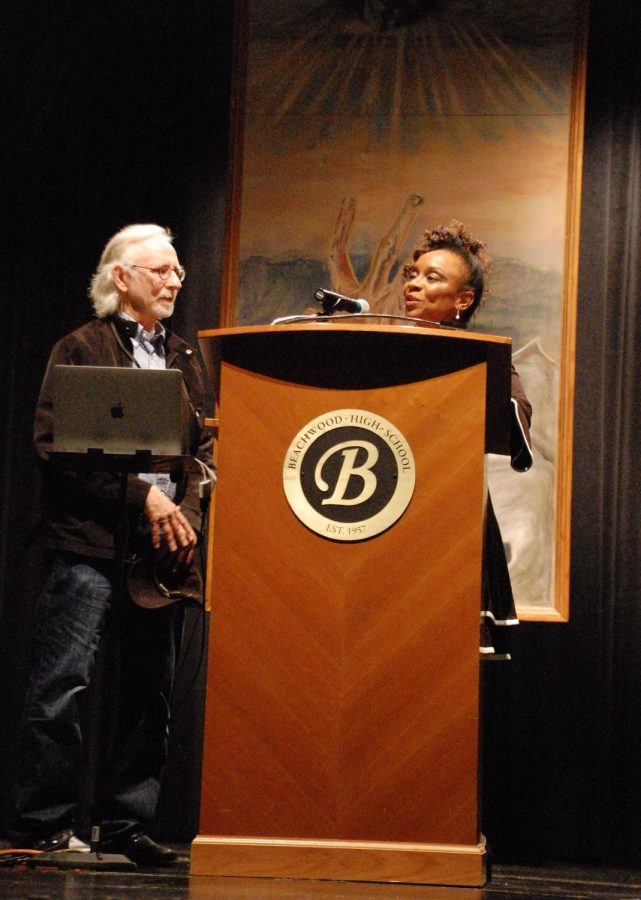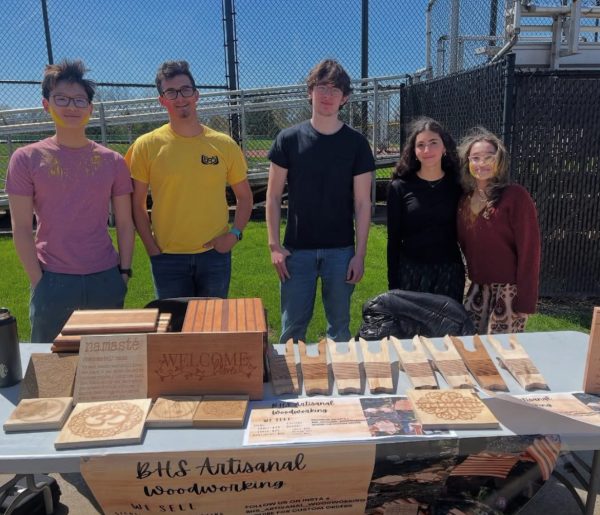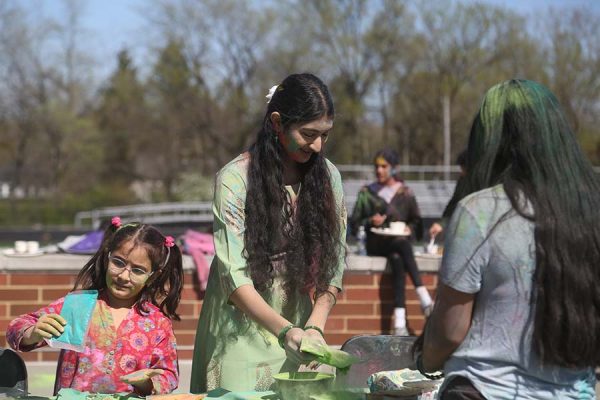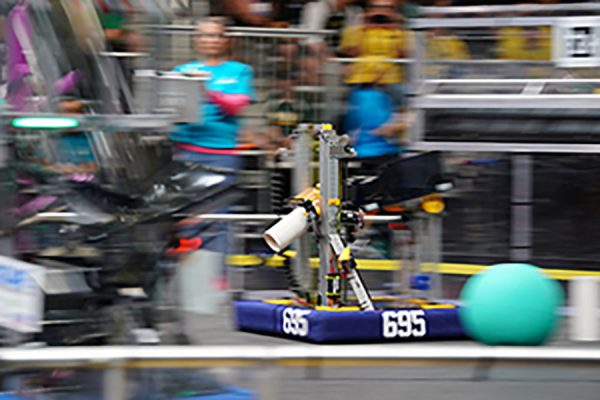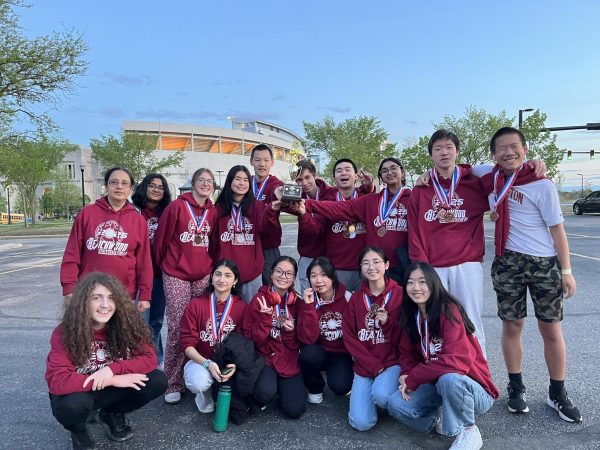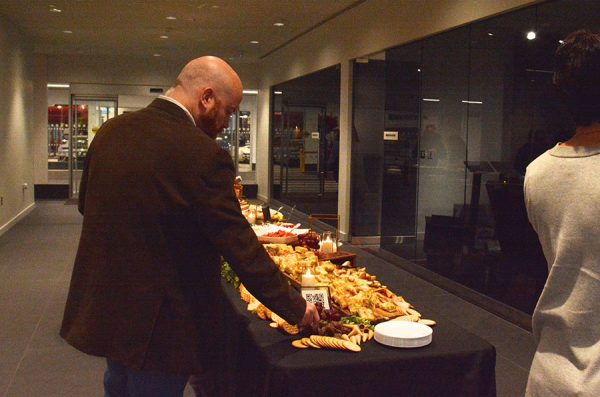Stanford Professor Jennifer Eberhardt Returns to BHS
Dr. Eberhardt reconnects with her high school art teacher Allen Scott, now retired. They stand in front of a painting celebrating the civil rights movement, painted by Eberhardt and a friend in Scott’s class.
Beachwood alum and Stanford University Professor Dr. Jennifer L. Eberhardt, an award-winning psychologist who studies unconscious bias, addressed the high school on Wednesday, Nov. 6.
Eberhardt was introduced by BHS senior Priyanka Shrestha.
“Please join me in welcoming Dr. Jennifer L. Eberhardt back to Beachwood,” Shrestha said.
Eberhardt had spoken to teachers at an in-service the day before and presented to parents on Wednesday evening.
The MacArthur Foundation selected Eberhardt as a MacArthur Fellow in 2014 for her research on hidden prejudices. She was inducted into the Beachwood Gallery of Success in 2006. She recently published a book called Bias.
Administrators invited her to speak to the school in order to help address issues of equity and inclusion.
“She has a similar experience to [many] students,” said Kevin Houchins, Director of Equity and Community Engagement. “She came from a different place…had successes and struggles and a lot of students can identify with her experiences.”
Eberhardt began her speech by testing the students. She briefly showed an image of a white woman, gave the woman’s name and some details about her life then presented a slide with different white women and asked students to identify the same woman out of a gallery of white female faces. She repeated this process with an African American woman.
The point of this exercise was to demonstrate that people are more likely to recognize faces of our own race, revealing our hidden biases.
In her speech, Eberhadt described what it was like to grow up in Cleveland and move to Beachwood in seventh grade. In Beachwood there were more resources and opportunities, making success possible for everyone. While everyone was nice, she had a hard time matching names to faces due to the sheer number of white students.
“The move changed me in some ways,” she said. “I became acutely aware of inequality.”
She also mentioned the role that art teacher Allen Scott played in her life. Calling him the “Yoda” of Beachwood, she said that he was a key adviser and ally in her life. He even inspired her to pursue art in college; however, that career path was short-lived as she realized it wouldn’t be the same without Scott’s mentorship. That’s when she realized that all the things she loved about art with Mr. Scott would drive her to pursue a career in psychology.
“I associated art with ideas, solutions to challenging problems, freedom to think and feel differently,” Eberhardt said.
Eberhardt also referenced a painting in her book that she did with her friend in art class. They painted a tree coming out of the mountains, which, upon closer inspection, becomes a hand reaching out of a throng of robed KKK members. The hand reaches out towards the sun, where an image of Martin Luther King, Jr.,’s face is painted.
Superintendent Dr. Bob Hardis said the painting had been lost during the school’s renovation, and he was not sure whether it could be found. Knowing how much it meant to Eberhardt, school administrators searched for the painting and surprised her with it at the assembly.
Eberhardt also talked about the role the brain plays in bias. She said that our neural pathways begin to categorize the familiar and the unfamiliar, and the more time spent with people of a given skin tone, the more the brain is familiarized with them.
She went on to talk about the criminal justice system, explaining that a man who is more stereotypically ‘black’ is more likely to receive a harsh sentence than a man of a lighter skin tone who committed the same crime. She said that stereotypes guide everyone’s views and actions, including those who should be neutral, such as judges and prosecutors.
“Six in ten Americans believe race relations are generally bad,” Eberhardt said. “The majority feels things are getting worse, slipping back in time, and are struggling to understand what’s going on.”
Eberhardt also said that science helps to soothe the pain when looking at bias. One of the reasons she conducted so much research was to better understand bias. Science can also help find ways to combat bias.
“We are not doomed to be under its grip; we’re not always vulnerable to always act on bias all time or be affected by it all the time. There are conditions that can muffle it; understanding can help curb it,” Eberhardt said.
Eberhardt ended her speech with a story about teaching a psychology class at San Quentin prison. During her first class, she asked the students why they decided to take the class. One man said he had been incarcerated since he was 14-years-old.
“I want to understand how free people think,” he told her.
That made her realize that so many people are trying to move towards freedom. She said that Beachwood is helping students move towards freedom.
“Beachwood is helping you—helping you [attain] a position to contribute to society, helping you see differently… see more… as you prepare to graduate,” she said.
“Know there is so much to look forward to, also know that it’s a mess out there, and the world needs you… your courage, imagination, insight and energy,” she added. “Wherever or however you decide to embed yourself in the world, Beachwood is a place you can come back to.”
Eberhardt then gave students a little pop quiz based on her presentation. Those who guessed correctly received a signed copy of her book.
Unconscious bias impacts how students are treated in school; however, there are ways to combat the impacts of bias.
“She outlined it in her book and in conversation: slowing things down,” Houchins said. “Instead of having instant reactions, [people should] slow down and think.”
“People see things happening and make assumptions… without trying to ask questions or find out the truth– as she talked about in her book–[we need to] put friction [into the decision-making process],” he added.
Houchins described a situation in which he has slowed down his own decision-making process.
“Let’s say I’m passing through the school and there’s a kid who is having a conflict,” he said. “Before I assume that this kid is causing trouble, the thing I’ve started doing is to ask if they’re okay.”
Houchins feels that this process could improve the school environment for everyone.
“Put that friction in, and a lot of times you’ll find there is a reason, and people are just reaching out to you,” he continued.
Many students and staff members appreciated Eberhardt’s message.
“I liked the big art reveal, and I appreciated that she came back to Beachwood,” junior Amanda Bendis said.
“I think it confirmed for me that we all have implicit bias, and we need to work hard to try to recognize that and to try to combat it,” Social Studies teacher Melissa Buddenhagen said.
“I think her research about bias against suspects is really important because it speaks to all the issues we have as a nation around law enforcement and judicial system,” she added. “It was really impactful.”
“[There were] so many impactful parts, what resonated with me was how much her interaction with Mr. Scott impacted her life,” library assistant Paige Dudley said. “[It was surprising] that she can take the things we look at as not connected and connect those.”
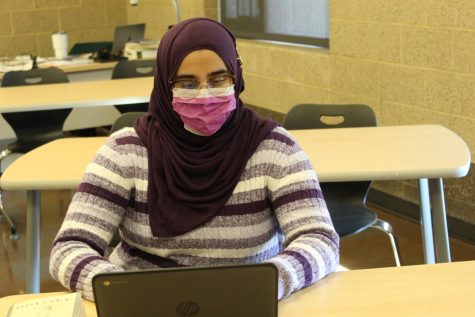
Hiba Z. Ali began writing for the Beachcomber in fall of 2019. She covers diversity in the school. In addition to writing for the Beachcomber, she also...

Elizabeth Metz began writing for the Beachcomber in 2018. She enjoys covering identity politics and sports. In addition to writing for the Beachcomber,...



